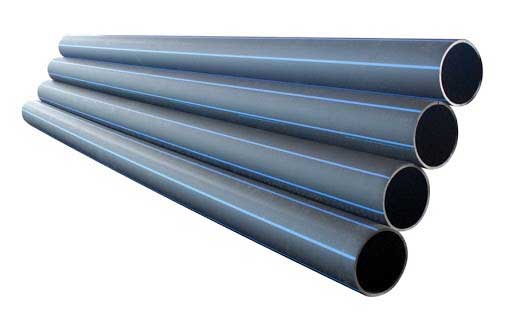Texas hdpe pipe manufacturer: Sustainable Innovations
Comprehending the Key Conveniences of HDPE Pipe for Water and Wastewater Administration
Using HDPE pipeline in water and wastewater management offers various advantages that merit factor to consider. Its remarkable longevity and long life-span make it a preferred option for many jobs. Furthermore, the product's resistance to rust and chemical damage boosts its reliability in various settings. Nonetheless, the advantages extend past simply long life and resistance. Exploring its cost-effectiveness and ecological effect exposes much more compelling reasons for its extensive fostering in contemporary facilities
Phenomenal Toughness and Long Life

HDPE pipeline sticks out for its outstanding sturdiness and durability, making it a preferred selection in water management systems. Built from high-density polyethylene, these pipes can endure considerable stress and stress and anxiety, making sure reliable performance in time. Their robust nature permits them to endure severe environmental conditions, consisting of temperature variations and soil movements, which can cause other products to stop working.
The life-span of HDPE pipes typically goes beyond 50 years, supplying an affordable option for towns and markets alike. Additionally, the material's light-weight buildings simplify installment, reducing labor expenses and durations. This sturdiness minimizes the demand for constant fixings or replacements, better enhancing its financial allure.
In water administration applications, the dependability of HDPE pipes suggests less interruptions and enhanced solution connection, making them integral to sustainable framework development. The combination of longevity and long life solidifies HDPE's function as a cornerstone in effective water management options.

Resistance to Deterioration and Chemical Damages
While several materials yield to deterioration and chemical damages with time, HDPE pipes show remarkable resistance, making them suitable for different water administration applications. This resilience stems from the molecular framework of high-density polyethylene, which is naturally non-reactive and does not corrode like metals or degrade from exposure to harsh chemicals. Therefore, HDPE is extremely reliable in environments with aggressive substances, such as wastewater systems that might consist of acids, bases, and natural solvents.
Furthermore, HDPE pipelines can endure environmental elements such as dirt level of acidity and saline problems, further enhancing their suitability for diverse applications (Pipe Manufacturing Midland TX). Their ability to preserve architectural integrity gradually lowers the danger of leaks and failures, which is critical in guaranteeing the safety and security and dependability of water distribution and wastewater monitoring systems. The resistance to corrosion and chemical damage significantly adds to the total effectiveness and longevity of HDPE piping options.
Cost-Effectiveness and Economic Advantages
When thinking about the monetary effects of water monitoring systems, the cost-effectiveness of HDPE pipelines ends up being obvious. These pipes provide lower setup and upkeep costs contrasted to conventional materials like metal or concrete. Their light-weight nature streamlines transport and setup, leading to lowered labor costs. Furthermore, HDPE pipes exhibit a long lifespan, typically going beyond half a century, which converts to less replacements and long-lasting savings.
Moreover, the resistance of HDPE to deterioration and chemical damage minimizes the demand for pricey repairs and replacements. The pipes additionally support reliable water circulation, minimizing energy expenses connected with pumping systems. By minimizing leaks and water loss, HDPE pipes add to substantial financial advantages for municipalities and industries alike. Generally, the preliminary financial investment in HDPE piping can produce considerable monetary returns over the life-span of the water administration system, making it a sensible choice for sustainable framework development.
Environmental Sustainability and Minimized Influence

Convenience and Flexibility in Installation
Due to their distinct buildings, HDPE pipelines use amazing flexibility and versatility in installment, making them appropriate for a broad array of applications. Their lightweight nature permits less complicated handling and transportation, decreasing labor costs and installment time. HDPE pipelines can be curved and formed to fit different terrains and project demands, which is especially advantageous in challenging environments.
In addition, their resistance to rust and chemical damages permits setup in varied settings without the need for here specialized safety layers. The ability to fuse joints develops a continual, leak-free system, improving the general stability and reliability of the installment. HDPE's adaptability additionally fits ground activity, lowering the threat of damages in locations prone to changing soil. Overall, these attributes make HDPE pipelines not only flexible but likewise a recommended selection for water and wastewater administration systems.
Often Asked Inquiries
Exactly How Does HDPE Pipe Contrast to PVC in Water Administration Applications?
HDPE pipeline uses remarkable flexibility, resistance to corrosion, and sturdiness contrasted to PVC. Its lighter weight helps with much easier installment, while its lengthy life-span lowers substitute costs, making HDPE a favored choice in water management applications.
What Is the Lifespan of HDPE Piping Under Regular Problems?
Under typical conditions, HDPE pipelines can have a life-span varying from 50 to 100 years. Their resilience and resistance to rust add to their lasting efficiency in various applications, making them a trustworthy selection for framework.
Are HDPE Piping Recyclable After Their Service Life?
Yes, HDPE pipes are recyclable after their life span. custom hdpe pipe manufacturing Midland TX. They can be refined and repurposed into brand-new products, considerably minimizing environmental impact and advertising sustainability within the industry, making them a green choice for piping remedies
What Is the Installment Process for HDPE Piping?
The installment process for HDPE pipelines entails website prep work, trenching, pipe combination or mechanical joining, backfilling, and stress testing. Proper techniques ensure a long lasting and reliable system for moving water and wastewater effectively.
Can HDPE Piping Be Utilized for Both Safe And Clean and Non-Potable Water Solutions?
Yes, HDPE pipes can be made use of for both potable and non-potable water supply. Their flexibility, longevity, and resistance to rust make them appropriate for different applications, ensuring safe and effective transport of water in various contexts.